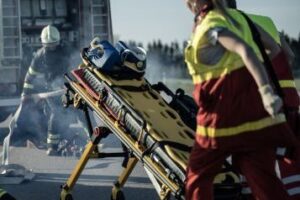Workers’ Compensation Benefits Under Florida’s “Heart-Lung” Bill

When it comes to the average worker, Florida’s workers’ compensation laws are fairly strict. However, when it comes to first responders and other public employees, the Florida legislature has expanded their ability to recover benefits if they have been injured on the job. A law called the Florida Heart-Lung Bill allows firefighters, law enforcement officers, correctional officers, and other categories of public employees to recover benefits if they develop cardiovascular conditions at work – though it can be difficult to establish that you qualify under the criteria.
Who Benefits?
Essentially, the Heart-Lung Bill states that if a first responder contracts “tuberculosis, heart disease, or hypertension” during the period of their employment, it will be presumed to have occurred on the job as long as it was not a preexisting condition. However, a mere positive test will not be sufficient to trigger protections; there are other, additional criteria that a person must meet before they will be said to have qualified. They are:
- You must be a first responder or public employee as listed in the statute;
- You must be totally or partially disabled as a result of the condition you have contracted; and
- You must have passed a pre-employment screening that did not show any evidence of the condition you now have. For example, if you develop hypertension while working as a first responder, you may receive benefits if you are able to demonstrate that you did not have hypertension when you started work.
These facts must be present, in addition to medical proof that you have tuberculosis, heart disease, or hypertension at the current time, in order for you to qualify under the Heart-Lung Bill.
Document Everything
It is important to keep in mind that if the four criteria listed above are qualified, a person will be eligible for benefits, regardless of whether they developed the condition on or off the clock, or whose fault it is. If you do qualify, you will generally receive the same type of benefits as any other injured worker, to the point where you reach what is known as your date of maximum medical improvement (MMI). MMI is a point where you can be said to have recovered as much as you can – which in turn will affect the ultimate determination of your ability to work and whether or not your benefits will continue.
That said, it is sadly not uncommon for an employer to contest this type of claim because it can affect their bottom line if the claim is accepted. You may require the help of a knowledgeable attorney in order to establish that the four required criteria have been met. It can be difficult to establish sufficient medical need in Florida, and the testimony of expert witnesses may be required in order to verify your claim. The process can be difficult – but it is not impossible to overcome.
Contact An Orlando Workers’ Compensation Attorney
The Heart-Lung Bill can give much-needed help to first responders who are injured on the job. If you believe that you might qualify under its provisions, an Orlando workers’ compensation attorney from the Hornsby Law Group can help you determine whether or not you have a case. Contact our office today at (407) 499-8887 for a free consultation.
Source:
flsenate.gov/Laws/Statutes/2018/112.18